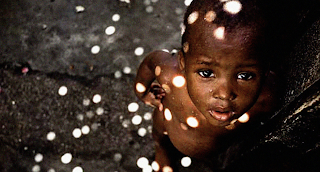Picture this: A small child, obviously malnourished, thirsty, hungry, dirty ... hopeless ... is standing at your front door. When you open the door to see who's knocked, you see the child looking up at you asking, "Will you please help me?" What would you do?
Rhetorical question, of course. Anyone with a heart would rush them inside, quickly feed them and give them some ice cold water, bath them, and show them love. Finding out who their parents are, etc. would be secondary. The imperative would be to help them immediately.
Now picture this: The same child is off your property, 3-4 houses down, standing on the corner. Would you help then? How about if the child was 1-2 miles away from your home?
Now, what if that child was on the opposite side of the globe, in some town you've never even heard of? Still malnourished. Still hungry and thirsty and dirty and without love. What would you do then?
Not such a rhetorical question anymore.
Why does proximity matter? Is the child less in need, less hungry, less thirsty, less in need of love ... because he/she is far away? Again, with the rhetorical questions. But, unfortunately, that is how we look at it. Me included. More appropriately, that is how we don't think about it.
There's a saying for that: "Out of sight, out of mind." We're not evil for not thinking of those in desperate need 24x7. But our lack of thinking about it does not make it magically go away either. Something must be done and someone must do that something. You guessed it - that someone is us ... you and me.
It comes down to a simple truth - We are obligated to help others less fortunate than us. If I have two pieces of bread, and someone else has none, I am obligated to give one. Not by law. Not by some judgmental overseer telling us we must, but because we know it's the right thing to do. Even if you're not a faithful person, each of us has this "conscience" that tells us what we must do. And I don't want to be harsh, but rather to get reality on the table for all of us to examine ... the fact that we don't see those who are so dramatically less fortunate is no excuse for any of us. They are there.
Who can tackle this? You alone? Me alone? No, and no. But you and me and our relatives, our friends, our circle of influence and their circle of influence, et al? Absolutely we can. We just need to start AND (more importantly) continue. Consistently give. That takes two things: (1) intent to do something, and discipline to execute upon that intent, and (2) something that helps us to automate our intent and discipline because it's easy to forget.
Want to learn more? Go to GiveInstead.app or HowGiving.org for details >>
Rhetorical question, of course. Anyone with a heart would rush them inside, quickly feed them and give them some ice cold water, bath them, and show them love. Finding out who their parents are, etc. would be secondary. The imperative would be to help them immediately.
Now picture this: The same child is off your property, 3-4 houses down, standing on the corner. Would you help then? How about if the child was 1-2 miles away from your home?
Now, what if that child was on the opposite side of the globe, in some town you've never even heard of? Still malnourished. Still hungry and thirsty and dirty and without love. What would you do then?
Not such a rhetorical question anymore.
Why does proximity matter? Is the child less in need, less hungry, less thirsty, less in need of love ... because he/she is far away? Again, with the rhetorical questions. But, unfortunately, that is how we look at it. Me included. More appropriately, that is how we don't think about it.
There's a saying for that: "Out of sight, out of mind." We're not evil for not thinking of those in desperate need 24x7. But our lack of thinking about it does not make it magically go away either. Something must be done and someone must do that something. You guessed it - that someone is us ... you and me.
It comes down to a simple truth - We are obligated to help others less fortunate than us. If I have two pieces of bread, and someone else has none, I am obligated to give one. Not by law. Not by some judgmental overseer telling us we must, but because we know it's the right thing to do. Even if you're not a faithful person, each of us has this "conscience" that tells us what we must do. And I don't want to be harsh, but rather to get reality on the table for all of us to examine ... the fact that we don't see those who are so dramatically less fortunate is no excuse for any of us. They are there.
Who can tackle this? You alone? Me alone? No, and no. But you and me and our relatives, our friends, our circle of influence and their circle of influence, et al? Absolutely we can. We just need to start AND (more importantly) continue. Consistently give. That takes two things: (1) intent to do something, and discipline to execute upon that intent, and (2) something that helps us to automate our intent and discipline because it's easy to forget.
Want to learn more? Go to GiveInstead.app or HowGiving.org for details >>




